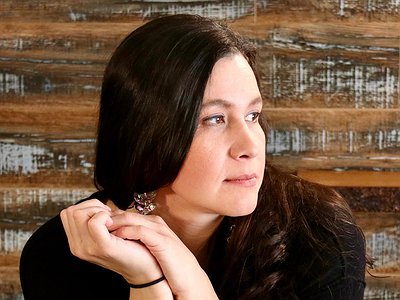Name: Katherena Vermette
Nationality: Canadian
Occupation: Author, poet, filmmaker
Current publication: Katherena Vermette's The Strangers is out via Penguin.
If you enjoyed this interview with Katherena Vermette, visit her insightful official website to find out more.
When did you start writing- and what or who were your early passions and influences? What what is about literature and writing that drew you to it?
I started writing when I was a kid. I think as soon as I could make sentences, I was making things up with words. Mostly poetry.
For years, it was only poetry. Bad, rhyming poetry but eventually I got a bit better. I was drawn to the act of writing, the freedom in it. I still am. Every day.
For most artists, originality is preceded by a phase of learning and, often, emulating others. What was this like for you: How would you describe your own development as an artist and the transition towards your own voice?
I definitely emulated. I read and then wrote like that, it was practice. Good practice. When you learn piano you play the songs others wrote. That’s how you learn. You figure out what works, what doesn’t, what rings true and what is not for you.
Writing teachers call this “finding your voice”. It is a painstaking, agonizing process, but it works.
How do you feel your sense of identity influences your creativity?
Probably a whole lot. My work tends to centre on emotional life and experience, and identity and sense of self is a big part of that.
I am fascinated with the process of identity, finding it, seeking it, losing it. And I write a lot about teenagers who are forever figuring out who they are because that is the work of adolescence.
What were your main creative challenges in the beginning and how have they changed over time?
When I started writing professionally I was obsessed with finding out how to do it, how to write a poem, a collection, a short story, a novel. I still do that.
Every story, book, poem is a new adventure and the how of it is unknown. That’s the same. Everything else in my life is different – I have less challenges overall, but the work is always a challenge, and should be, I think.
How do you see the relationship between style, form, plot and storytelling – and how would you rate their importance for you, respectively?
Storytelling, form, style, plot – in that order. The story is everything, how to tell it is next. Plot is necessary but not at the expense of everything else.
I’d also put character, setting, and image in there somewhere too. But yeh, everything before plot. Once you have everything else, plot finds you.
Could you take us through a day in your life, from a possible morning routine through to your work? Do you have a fixed schedule? How do writing and other aspects of your life feed back into each other - do you separate them or instead try to make them blend seamlessly?
For me, a regular working day starts with coffee, lots of coffee and then going through the process of getting the other humans out of the house so I can think and write. I let my dogs stay.
I like schedules and order, and I am fixed to times of day so I need to make certain things happen at certain times. I only have the big energy for writing / creating in the morning so I usually write ferociously until I’m hungry. Then I go do other life things, like walking the patient dogs.
I do most of my big planning and thinking when I’m walking them. They should really get all the credit for stuff like that.
There are many descriptions of the ideal state of mind for being creative. What is it like for you? What supports this ideal state of mind and what are distractions? Are there strategies to enter into this state more easily?
I need a lot of peace, quiet, and of course, safety. Your brain literally can’t think if it doesn’t feel safe so I need that, as we all do.
I write slow and generally am slow and hate to be rushed. I don’t think I think when I’m rushed either.
So, in order to create anything, I have to give myself big chunks of time.

